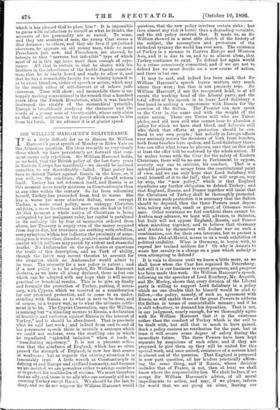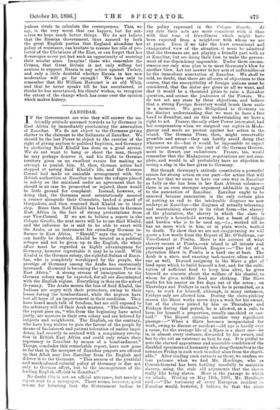SIR WILLIAM HARCOURT'S DELIVERANCE.
IT is a little difficult for us to discuss Sir William Harcourt's great speech of Monday in Ebbw Vale on the Armenian question. His ideas resemble so very closely those which we have persistently set forward that com- ment seems only repetition. Sir William Harcourt holds, as we hold, that the British policy of the last forty years in Eastern Europe has manifestly—we should be inclined ourselves to say discreditably—failed. That policy has been to defend Turkey against Russia in the hope, or, if you will, on the condition, that Turkey should reform itself. Turkey has not reformed itself, and Russia is at this moment more nearly mistress in Constantinople than at any time within the century. So far from reforming herself, Turkey has proceeded from bad to worse. She has a worse yet more absolute Sultan, more corrupt Pashas, a more cruel policy, more unhappy Christian subjects, a more licentious soldiery than she had in 1855. At this moment a whole nation of Christians is being extirpated by her malignant ruler, her capital is paralysed in its ordinary life by fear of massacres ordered from above, her Treasury is empty even of the money required from day to day, her provinces are seething with rebellion, every symptom within her indicates the proximity of some- thing much worse than disorder, positive social dissolution, amidst which millions may perish by violent and shameful deaths. No Ambassador on the spot denies or questions the truth of this description, and no Turk of ability, though the latter may invent theories to account for the situation which no Ambassador would admit to be true. The necessity for a new policy is patent ; and if a new policy is to be adopted, Sir William Harcourt declares, as we have all along declared, there is but one which can be adopted with any hope that it will secure practical or beneficial results. This is to give up finally and formally the protection of Turkey, parting, if neces- sary, with Cyprus, which we received as a consideration for our promised protection, and to come to an under- standing with Russia as to what is next to be done, and of course, in a vaguer way, as to what the ultimate settle- ment is to be. The Cyprus Convention, says Sir William, is nothing but " a standing menace to Russia, a declaration of hostility and exclusion against Russia in the interest of Turkey," and it should be abandoned. That is precisely what we said last week ; and indeed from end to end of his persuasive speech there is scarcely a sentence which we could not endorse, even the startling one in which he repudiated " splendid isolation " when it leads to "humiliating impotency." It is not a pleasant reflec- tion that the aloofness of England, which has so often proved the strength of England, is now her first source of weakness ; but as regards the existing situation it is lamentably true. A little wretch at Constantinople is defying us and Europe and civilised humanity, and because we are isolated we are powerless either to avenge ourselves or to protect his multitudes of victims. We must therefore find an ally, and there is no ally who can seriously aid us in coercing Turkey except Russia. We should be the last to deny, and we do not suppoae Bk. William Harcourt would question, that the new policy involves certain risks ; but then almost any risk is better than a degrading certainty, and the old policy involved that. It made us, as Sir William showed in a most able sketch of the history of the subject, the accomplices and protectors of the wickedest tyranny the world has ever seen. The existence of Turkey is a menace to Eastern Europe and Western Asia, and it is due to us, and to us almost alone, that Turkey continues to exist. To defend her again would be a crime consciously committed, and if we are not to defend her we must decide on a new course of action, and there is but one.
It may be said, and indeed has been said, that Sir William Harcourt's speech leaves matters very much where they were ; but that is not precisely true. Sir William Harcourt, if not the recognised head, is at all events the working head of the Liberal party, and the total effect of his speech is to leave Lord Salisbury a free hand in making a compromise with Russia for the coercion of the Sultan. The Premier can now speak to the Czar in the name and with the weight of the entire nation. There are Tories still who are Turco- philes, and old men still who cannot bear to abandon a policy for which we have shed blood, and Liberals still who think that efforts at protection should be con- fined to our own people ; but nobody in foreign affairs ever seriously resists the decisions of both front benches, both front benches have spoken, and Lord Salisbury there- fore can offer what terms he pleases, sure that on this side at least the offer will be endorsed by the whole nation. If he makes terms with the Czar for the safety of Eastern Christians, there will be no one in Parliament to oppose, scarcely any one to criticise, his conduct. That is a splendid position to occupy from the constitutional point of view, and we can only hope that Lord Salisbury will avail himself of it to the full ; that he will urge on, step by step, the " new policy," which is that England repudiates any further obligation to defend Turkey ; and that England, Russia, and France together will insist that the Christians of Turkey shall be thoroughly protected. If to secure such protection it is necessary that the Sultan should be deposed, then the three Powers must depose him, taking any risk, small or great, of Ottoman resist- ance. Other resistance we feel confident there cannot be. Austria may advance, we hope will advance, to Salonica, but Italy will not oppose England, Russia, and France when marching together, and to believe that Germany and Austria by themselves will declare war on such a combination, not for their own interests, but to protect a man like Abd-ul-Hamid, seems to us a weak exhibition of political credulity. What is Germany, to begin with, to expend her trained soldiers for ? Or why is Austria to waste her cavalry in a charge on a pass which nobody is even attempting to defend ?
It is vain to discuss until we know a little more, as we shall know when the Czar has regained St. Petersburg ; but still it is our business to report progress, and progress has been made this week. Sir William Harcourt's speech, following on the speeches of Lord Rosebery, Mr. Asquith, and Mr. Morley, shows that every division of the Liberal party is willing to support Lord Salisbury in a policy which no one doubts that he himself would be glad to follow,—the policy, namely, of such an agreement with Russia as will enable three of the great Powers to address the Sultan in terms of unmistakable menace ; and if he is still refractory, to demand his deposition. That is not, in our judgment, nearly enough, for we thoroughly agree with Sir William Harcourt that it is the existence rather than the conduct of Turkey which is the evil to be dealt with, but still that is much to have gained. Such a policy ensures no retribution for the past, but at least it will secure some degree of safety during the immediate future. The three Powers have been kept separate by suspicions of each other, and if they are prepared to give them up they will be united for this special work, and once united, resistance of a serious kind is almost out of the question. That England is prepared is now past question, all her leaders practically affirm- ing the same thing, and if Russia, whose decision includes that of France, is not, then at least we shall know where the responsibility lies. We shall be free, if we accept Sir William Harcourt's advice, of all moral impediments to action, and may, if we please, inform the world that we are going on alone, leaving our jealous rivals to calculate the consequences. This, we say, is the very worst that can happen, but for our- selves we hope much better things. We do not believe that the Russian Government, thus assured by both the great English parties that England abandons her policy of resistance, can hesitate to resume her role of pro- tector of the Christians of the East, or can forget that her Sovereigns never yet had such an opportunity of securing their secular aims. Imagine ! those who remember the Crimea, that Great Britain is not only willing but anxious to support Russia in any action against Turkey, and only a little doubtful whether Russia in her new moderation will go far enough ! We have only to remember that Sir William Harcourt is an old Whig, and that he never speaks till he has ascertained, or thinks he has ascertained, his clients' wishes, to recognise the extent of the change which has come over the opinion which makes history.



















































 Previous page
Previous page